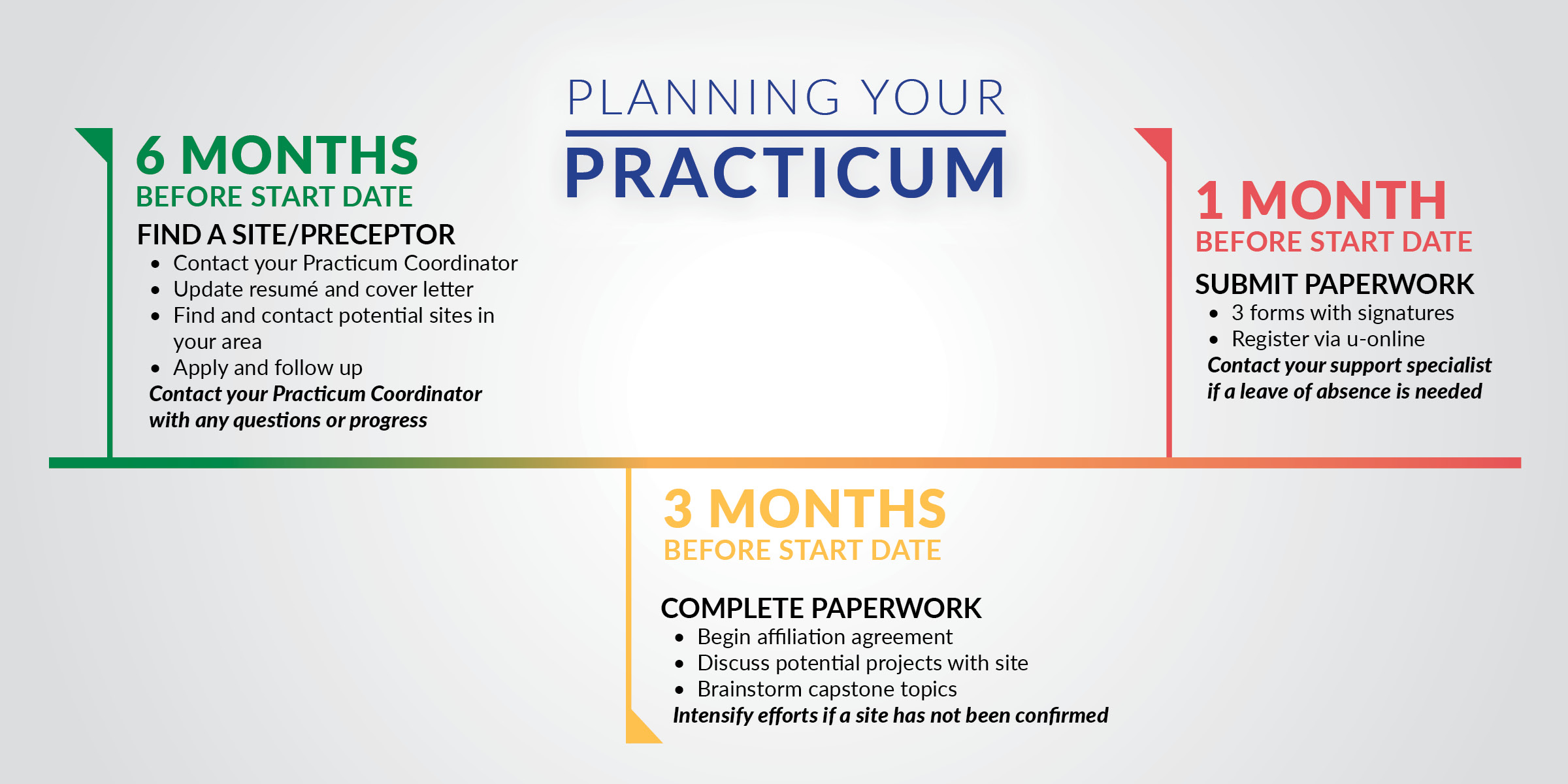What are the requirements of my MPH practicum?
Students are required to complete at least 120 hours of field work at a public health agency as well as a 15-20 page research paper on a topic related to their field work. Students have one semester (~16 weeks) to complete the requirements.
What is the suggested timeline for the Practicum?
Where do students usually complete their field work?
Organizations at which students have completed their field work include City or State Health Departments, Local Hospitals (usually their outreach departments), K through 12 schools, Universities and Affiliated Research Units, Senior Centers and various Small Community-Based Organizations. Here is a list of places at which students have completed their field work. Please note that this is not a comprehensive list and we cannot guarantee that the sites on this list are current taking students. This list should only be used as an example of potential sites and projects.
Can you help me find a site?
The practicum coordinator can help by discussing the type of places you can explore and brainstorming potential sites in your area. Career services and/or the practicum coordinator can also assist with resumes and cover letters if needed. However, it is the student’s responsibility to secure a site.
How do I go about finding a site?
It is recommended that you approach the process like a job search. You should first think about what you would like to do with your MPH since practical experience is a good opportunity for students to learn more about a specific organization or type of work. Do research online or talk to your friends/professional networks to know what public health agencies are available in your area. An informational interview at an organization of interest can be a great first step, too. Know the organization, the work they do, your skill sets and how you might be able to contribute to their work — mention a specific area of work to show that you’re familiar with their work, but also emphasize that you’d be open to other potential projects that align with your interests/skill sets. In the introduction of your cover letter, be sure to clarify that you’re applying for an (unpaid) opportunity to fulfill your MPH requirements. Most of the communications can be done via email, however, it is important to personally meet your potential preceptor if at all possible. (Do not show up at their workplace without reason. If the organization hosts a public event or seminar, you should consider attending as it is an opportunity to introduce yourself and show your interest).
Can I do my practicum hours at my workplace?
You can do your practicum hours at your workplace if:
- The work you do for your practicum is different from your regular work, and
- Your work hours are not counted towards the practicum.
- Students should work in a different department and under a different supervisor.
Can I get paid for my practicum?
Students may receive a fellowship or merit-based stipend for practicum work; part-time jobs cannot be counted for practicum hours.
When should I begin the planning process?
It is never too early to start networking and identifying potential sites/preceptors. About six (6) months before you plan to start your practicum, you should be actively reaching out to potential organizations, and approximately three (3) months before your start date, you should be starting the paperwork. See the practicum page for the required paperwork and note that the affiliation agreement process can take up to three (3) months.
If you live in a remote area, please keep in mind that more planning time may be required to secure an approved practical site.
What is expected of the student and the preceptor?
The preceptor should be someone with appropriate credentials (MPH or similar) and/or extensive experience (>5 years) in public health. More importantly, the preceptor should be familiar with the student’s project, have expertise and commitment to mentor the student throughout the project, and be willing to communicate with the practicum coordinator if any concerns arise. Before the project begins, the preceptor meets with the student to discuss expectations, the timeline and the outcome of the project and signs the Site Approval and Preceptor MOU as well as the Goals and Objectives Forms. Once the project begins, the preceptor provides supervision and feedback to the student as needed (determined by the student and the preceptor) and completes quarterly report forms. The preceptor also completes a short evaluation form at the end of the class to provide feedback on the student’s overall performance.
The student should communicate regularly with the preceptor to get feedback and discuss progress, future plans, or any concerns. In addition to completing the hours and assignments listed on the syllabus, the student must also be familiar with and abide by the rules and regulations of the site (e.g. vaccinations, background checks, being on time, etc.) and ensure that course paperwork is completed on time.
Can I start my practicum hours prior to the class start date?
Students may begin counting their practicum hours when registration opens for the semester that they plan to register for GPH747 (e.g., if a student is taking GPH747 for the summer, they may begin their practicum when the registration opens, usually about a month prior to the beginning of the class). Students must submit an early start date petition describing the reasons for beginning the practicum early.
Can I take GPH 747 before completing all my coursework?
Students may petition to take GPH 747 before completing all coursework. The petition form must be approved by the Practicum Coordinator.
Are my practicum project and capstone paper the same?
For the capstone paper, you are required to identify a real-life public health issue and use the skills you have acquired during the public health program to identify solutions. Your capstone paper will be a reflection of how much you have learned during your MPH program. This is where you will demonstrate your analytical, public health sciences, and communication skills.
Some practicum projects require students to develop a questionnaire, or evaluate a program, or analyze some data – but no reports. Others require reports. If your site requires a written report, you will be writing 2 separate reports, one for the practicum and your capstone paper.



